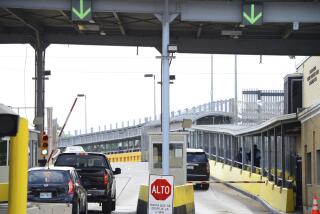D.A. Challenge of Student Voters Is a Civil Rights Lesson
When she enters the voting booth next month, Ashley McDonald says, she’ll be supremely conscious of her right to do so.
She is a student at historically black Prairie View A&M; University and lives in a city where the rights of students to vote in local elections have been challenged more than once.
Last fall, a local district attorney asserted that students like McDonald aren’t necessarily entitled to vote in county elections because they might not meet the legal definition of “resident.”
That view quickly led to statements to the contrary by Texas’ secretary of state and attorney general, who both affirmed the well-established right of students to vote in their university towns if they designate their campus address as their residence.
“College students cannot be targeted for discriminatory residency requirements and nothing prevents them from voting where they attend school,” Atty. Gen. Gregg Abbot said in a news conference this month.
It was a civics lesson brought to life, said McDonald, but one that’s testing a rural county where racial hostilities have long been on a low boil. “I don’t see how he thought he could take away anybody’s right to vote here. Students at other Texas colleges aren’t ever questioned on whether they’re qualified to register, but they are at Prairie View. It’s just not right,” said McDonald, 21.
Prairie View is west of Houston, in Waller County, which has a population of 33,591 and is 58% white and 29% African American.
Oliver Kitzman, the prosecutor who triggered the controversy, has stated in letters that he raised the residency issue because of citizen complaints about voter fraud. His views on student voting, he has said, were based on his interpretations of the election code and case law regarding definitions of “residence” and “domicile.” He has said that no discrimination was intended and that he will abide by the state’s opinions.
Nevertheless, the NAACP and four Prairie View students said they fear that Kitzman, who is white, will change his mind and prosecute students after they vote. Last week, they filed a federal lawsuit seeking to ensure that Kitzman treats Prairie View students as bona fide residents.
“The lawsuit is about fighting intimidation. The district attorney has said he doesn’t agree with the state’s opinions. No student should enter a voting booth and fear they might be put in jail for exercising their rights,” said Yolanda Smith, executive director of the Houston chapter of the NAACP. “It’s a situation very reminiscent of the ‘60s that unfortunately we’re having to deal with in 2004.”
Lawyers may also sue Waller County to increase the number of days early voting booths will be open at a local community center. The county plans to allow one day of early voting at the site, said Smith. “Students will have to wait in long, long lines. It’s a deterrent to voting,” said Smith. The NAACP also wants the county to provide an on-campus early voting site because many students don’t have transportation to the off-campus center, Smith said.
Waller County elections administrator Lela Loewe said one day of early voting is sufficient at a satellite site that attracts no more than 400 people. Early voters may also cast ballots at the county election office for two weeks beginning Feb. 23, she added.
The county uses the community center because it’s conveniently located and offers good parking for nonstudents, especially the elderly, Loewe said. The center is about 100 yards from a parking lot that some students use to get to their classes, she added.
“The fight they’re fighting is nothing because nothing is being denied,” said Loewe. “We let [students] register and we let them vote. Just because the D.A. said something doesn’t mean that’s what we’re doing.”
The controversy marks the second time in 25 years that a local official has challenged the voting rights of Prairie View A&M; students. In the 1970s, the Waller County voter registrar required students to complete a residency questionnaire; nonstudents were not asked to do so. The practice led to a lawsuit and a 1978 federal court order prohibiting the registrar from treating Prairie View students differently from other county voters.
In light of the latest controversy, the Justice Department is investigating whether Waller County is complying with the terms of the federal order.
Whether he meant to or not, “what Kitzman did was energize Prairie View students,” said Hendrik Maison, the student body president. In January, hundreds of students marched for seven miles to protest Kitzman’s interpretation of the law. Those same students eagerly await this year’s elections, Maison said.
“People are more interested than they have been in a long time. I can honestly say that students are really looking forward to voting.”
More to Read
Start your day right
Sign up for Essential California for news, features and recommendations from the L.A. Times and beyond in your inbox six days a week.
You may occasionally receive promotional content from the Los Angeles Times.






